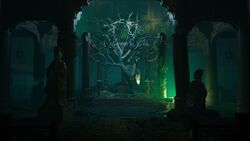The Digital Antiquarian on Ultima III and the founding of Origin Systems
The Digital Antiquarian on Ultima III and the founding of Origin Systems
Editorial - posted by Infinitron on Mon 13 May 2013, 19:41:54
Tags: Origin Systems; Richard Garriott; The Digital Antiquarian; Ultima; Ultima III: ExodusAfter a long hiatus from the topic, the Digital Antiquarian is back with a new retrospective article about the dawn of the CRPG genre. It's a continuation of last year's Ultima I and II retrospectives, covering Richard Garriott's departure from Sierra On-Line, the founding of Origin Systems, and the release of Ultima III: Exodus. Like all of the Digital Antiquarian's articles, it's very long and very interesting. Here's an excerpt:
The Antiquarian intends to follow this article up with a retrospective playthrough of Ultima III, and also with a writeup that will "set the record straight about another one of those persistent myths that dog fan histories of Ultima". What could he be referring to?
Given its flagship status, Garriott felt compelled to try to remedy some of the shortcomings of his earlier games. In particular, he was obviously eying the Wizardry series; for all of the Ultima series's stellar reviews and sales, the first two Wizardry games had garnered even better and more of both. Much of what's new in Ultima III is there in the name of addressing his series's real or perceived failings in comparison with Wizardry. Thus he replaced the single adventurer of the early games with a full party which the player must manage; added a new strategic combat screen to make fights more interesting; added a full magic system with 32 separate spells to cast to replace the simplistic system (which the player could easily and safely ignore entirely) of his previous games; added many new class and race options from which to build characters; made some effort to bring some Wizardry-style rigorousness to the loosy-goosy rules of play that marked his earlier games.
Notably, however, Ultima III is also the first Garriott design that doesn't simply try to pile on more stuff than the game before. Whether because he knew that, what with his family and friends all counting on him, this game needed to be both good and finished quickly or just because he was maturing as a designer, with Ultima III he for the first time showed an ability to edit. Garriott was never going to be a minimalist, but Ultima III is nevertheless only some 60% of the geographical size of Ultima II, the only example of the series shrinking between installments prior to everything going off the rails many years later with Ultima VIII. Also gone entirely is the weird sub-game of space travel, as well as — for the most part — the painful stabs at humor. Yet it's safe to say that Ultima III will take the average player much longer to finish, because instead of leaving huge swathes of game — entire planets! — dangling uselessly in the wind Garriott this time wove everything together with an intricate quest structure that gives a reason to explore all those dungeons. In fact, there's a reason to visit every significant area in the game.
Viewed from the vantage point of today, Ultima III is perched on a slightly uncomfortable border, right between the simple early Ultimas that predate it and the deeper, richer works that make up the heart of Ultima's (and Richard Garriott's) legacy today. I don't know if any other game in the series sparks as much diversity of opinion. To some it's just a long, boring grind, while a small but notable minority actually name it as their favorite in the entire series. Personally, I can appreciate its advances but take issue with many aspects of its design, which strike me as cruel and rather exhausting. My favorite of the early Ultimas, the one that strikes me as most playable today, remains Ultima I. But I'll talk about Ultima III at much greater length in a future post. For now let's just note that it gave CRPG players of 1983 exactly what they wanted — a big, convoluted, epic experience that pushed the technology even further than had the previous game — without the bugs and other issues that had plagued Ultima II.
[...] Ultima III began shipping in late August for the Apple II. Versions for the Atari 8-bit line and the Commodore 64 soon followed. Both ports were done by Chuck Beuche, whose role as a creative and technical force with Origin during these early days was almost as significant as Richard's. The game was a huge hit across all platforms; Ultima III became the first Ultima to top 100,000 units in sales, a mark that all of the following titles would surpass with ease. Indeed, this moment marks the point where Ultima pulled ahead of the Wizardry series once and for all to become simply the premiere CRPG series of its era. Despite the occasional worthy competitor like the Bard's Tale series, it would not be really, seriously challenged in that position until the arrival of the officially licensed D&D games that SSI would start releasing at the end of the decade. Happily, Ultima and Richard Garriott would prove worthy of their status; the next Ultima in particular would be downright inspiring.
The Antiquarian intends to follow this article up with a retrospective playthrough of Ultima III, and also with a writeup that will "set the record straight about another one of those persistent myths that dog fan histories of Ultima". What could he be referring to?
There are 17 comments on The Digital Antiquarian on Ultima III and the founding of Origin Systems














